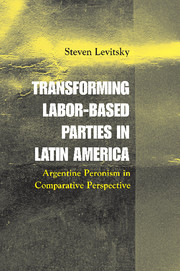Book contents
- Frontmatter
- Contents
- Figure and Tables
- Acknowledgments
- 1 Labor-Based Party Adaptation in the Neoliberal Era: Rethinking the Role of Party Organization
- 2 Origins and Evolution of a Mass Populist Party
- 3 An “Organized Disorganization”: The Peronist Party Structure in the 1990s
- 4 Populism in Crisis: Environmental Change and Party Failure, 1983–1985
- 5 From Labor Politics to Machine Politics: The Transformation of the Peronist Party–Union Linkage
- 6 Menemism and Neoliberalism: Programmatic Adaptation in the 1990s
- 7 A View from Below: Party Activists and the Transformation of Base-Level Peronism
- 8 The Paradox of Menemism: Party Adaptation and Regime Stability in the 1990s
- 9 Crisis, Party Adaptation, and Democracy: Argentina in Comparative Perspective
- References
- Index
5 - From Labor Politics to Machine Politics: The Transformation of the Peronist Party–Union Linkage
Published online by Cambridge University Press: 22 December 2009
- Frontmatter
- Contents
- Figure and Tables
- Acknowledgments
- 1 Labor-Based Party Adaptation in the Neoliberal Era: Rethinking the Role of Party Organization
- 2 Origins and Evolution of a Mass Populist Party
- 3 An “Organized Disorganization”: The Peronist Party Structure in the 1990s
- 4 Populism in Crisis: Environmental Change and Party Failure, 1983–1985
- 5 From Labor Politics to Machine Politics: The Transformation of the Peronist Party–Union Linkage
- 6 Menemism and Neoliberalism: Programmatic Adaptation in the 1990s
- 7 A View from Below: Party Activists and the Transformation of Base-Level Peronism
- 8 The Paradox of Menemism: Party Adaptation and Regime Stability in the 1990s
- 9 Crisis, Party Adaptation, and Democracy: Argentina in Comparative Perspective
- References
- Index
Summary
We beat the unions. We took the party from them.
– Renovation leader José Luis ManzanoWhere is Peronism if not in the unions?
– Peronist union leaderThe PJ underwent a striking coalitional change after 1983, transforming itself, in less than a decade, from a de facto labor party into a predominantly patronage-based party. At the national level, reformers removed old-guard unionists from the party leadership, dismantled traditional mechanisms of labor participation, and broadened the party's appeal to attract middle-class and independent voters. At the base level, PJ politicians used their access to public offices to build patronage-based support networks at the margins of the unions. Over time, patronage networks replaced unions as the PJ's primary linkage to its working- and lower-class base. As a result of these changes, organized labor's influence in the party declined precipitously. This process of deunionization contributed in an important way to the PJ's electoral success in an increasingly postindustrial electoral environment. It permitted the party simultaneously to appeal to a new constituency (new middle-class and independent voters) and find a new basis – clientelism – on which to maintain its old one (the urban poor). Moreover, by weakening a major opponent of neoliberal reforms and eroding the class basis of the urban Peronist identity, deunionization facilitated the PJ's programmatic shift to the right under Carlos Menem.
This chapter examines urban Peronism's transition from de facto laborism to machine politics.
- Type
- Chapter
- Information
- Transforming Labor-Based Parties in Latin AmericaArgentine Peronism in Comparative Perspective, pp. 107 - 143Publisher: Cambridge University PressPrint publication year: 2003



